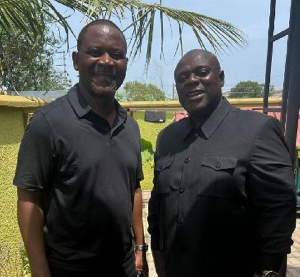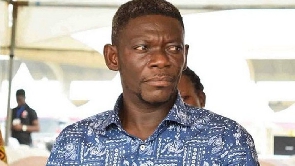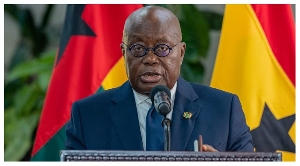- Home - News
- TWI News | TV
- Polls
- Year In Review
- News Archive
- Crime & Punishment
- Politics
- Regional
- Editorial
- Health
- Ghanaians Abroad
- Tabloid
- Africa
- Religion
- Election 2020
- Coronavirus
- News Videos | TV
- Photo Archives
- News Headlines
- Press Release
General News of Tuesday, 22 July 2014
Source: The Al-Hajj
Beleaguered Mahama desperate to revive economy
Despite the economic and political turbulence generated as a result of shaky and bumpy takeoff of his administration, President John Dramani Mahama has stubbornly vowed to utilize the remaining 30 months of his tenure in office to position Ghana in a manner only comparable to that of the country’s first president, Osagyefo Dr Kwame Nkrumah.
While many Ghanaians, especially critics of the present administration, mainly made up of members of the opposition New Patriotic Party (NPP) and their collaborators think he is sleeping on the job, the president is expected to take them by surprise by unveiling countless projects and programs in the next 12 months to radically address the country’s chronic unemployment situation and challenges facing the economy.
Impeccable sources close to the president told The aL-hAJJ that, the highly criticized administration has lined up ambitious and daring infrastructural projects and programs which cut across core and productive sectors of the national economy including ports and harbours, road construction, water projects, energy and railways among others to transform the economy, create jobs and reduce poverty across the country.
President Mahama has promised to get a tight grip on the fast dwindling economy and fix the present difficulties once and for all in order to bring respite to Ghanaians who have had to endure severe economic hardship and deprivation largely due to government’s highly criticized ‘homegrown’ economic policies introduced by the Finance Minister, Seth Terkper.
President Mahama’s infant administration has come under harsh criticism, mostly from the opposition elements for varying reasons, many of which centered on the ailing economy.
After inheriting a promising economy from his mentor, late President Mills, the Ghanaian economy under the 18 months of the Mahama administration has suffered severe hiccups leading to a fast depreciating currency, high inflation and interest rates among others.
Paradoxically, almost all the economic fundamentals under president Mahama’s watch, even with an astute economist as vice-president and head of economic management team, remain unfavorable leading to an unprecedented twin budget deficit for two consecutive years, galloping inflation, escalating interest rates and free fall of the cedi.
These shocks in the economy have culminated into severe hardship in the country with members of the president’s own party and some Ghanaians in general calling for the head of the Finance Minister, Mr. Seth Terkper.
Interestingly, Mr. Terkper was deputy to former Finance and Economic Planning Minister under the Mills administration, Dr. Kwabena Duffuor, under whose watch very impressive economic achievements were chalked among which included sustained single-digit inflation for almost 32 months, T-Bill rate below 10 per cent, growth rate of 15 per cent and budget deficit of 4 per cent of GDP all in 2011 and unprecedented currency stability among others.
While pressure was mounting on him from members of his own party to fire his Finance Minister, President Mahama openly came out to defend Mr. Terkper, reposing confidence in his policies to ‘reform’ the economy.
As the macro-economic environment continued to deteriorate rapidly, the party and public grumblings over the performance of the finance minister became louder and fiercer forcing President Mahama to take the bull by the horn and appoint two experts in economic and finance to beef up the Ministry of Finance and bridge any inadequacy.
President Mahama, in a bold move to turn the situation around, appointed Dr. John Kofi Baffoe from the Africa Development Bank as a Technical Adviser to the Finance Minister and Mrs. Mona Helen K. Quartey as deputy finance minister to replace Mr. Kweku Ricketts Hagan and bring some fresh ideas and urgency on how to salvage the ailing economy.
Mrs. Mona Helen K. Quartey is said to be a forward-looking professional with expertise in risk management and corporate finance.
With an excellent international experience in equity and debt rising in Africa, Europe and North America over the years, she has a strong structuring and negotiations skills and a wealth of work experience in the mining and finance industry. Her confidence, composure, eloquence at the recent parliamentary vetting had enthralled many Ghanaians including cynics, and indications are that she is capable of leading the President’s agenda at transforming the economy within the shortest possible time.
On his part, Dr. John Kofi Baffoe is an economist with the African Development Bank, with over thirty years of experience at the most senior levels in Macro and Development Economics. He is also bringing to the table over three decades of experience to help change the direction of the economy in line with the President’s vision of social and economic transformation.
Surprising, this is the first time in recent memory that any President in the Fourth Republic has appointed and openly announced an adviser for his finance minister as part of a ministerial reshuffle.
The convention is that the minister himself selects his own adviser(s) as soon as he assumes office.
These two individuals are expected to work very hard at the Ministry of Finance to help fill the existing economic management gaps so as to bring the much-awaited economic turnaround the President is yearning for. President Mahama is said to have personally tasked them to help change the direction of the economy.
However, what is not clear is whether these two technocrats will receive the maximum co-operation and support of finance minister Terkper to help implement the impressive vision of President Mahama.
Part of the President’s calculus for macro-economic stability and concomitant national economic takeoff is the securing of US$2bn (two billion dollars) syndicated loan by Cocoboard for the purchase of cocoa beans for the 2014 crop year. Aside this, the Mahama administration is expected in the coming days to secure another US$1bn (one billion dollars) from soon to be issued Eurobond.
These huge inflows are not new to Ghana, but what makes the difference now is the size and timing (equivalent to $3bn CDB loan whose full disbursement has faced challenges).
According to economic experts, the inflows will not only help stabilize in the Cedi in the short term but will also help to spur economic growth and create employment opportunities for the teeming youth across the country. Already, the Mahama administration has over the past two weeks almost done away with what has become known as ‘dumsor dumsor’ (the debilitating power rationing) although government is yet to officially announce it.
In the next few weeks, government is also expected to bring on stream the Gas Infrastructural Project in Atuabo to help drastically cut down on dependent on expensive light crude in powering the nation’s thermal plants. This will save the country millions in foreign exchange thus helping to further reduce pressure on the depreciating currency.
Again, while the construction of a new proposed oil and gas port at Atuabo is awaiting parliamentary approval and it is expected to commence operation in 2016 to create jobs and generate revenue for the country, the port in Tema, the industrial hub of the country is billed to receive massive expansion to accommodate the increasing traffic.
Cocoa and gold prices, which have precipitously fallen in 2013 fiscal year and caused the nation to lose over US$1.5bn, have begun picking up impressively.
Buoyed by these favourable economic prospects in the coming months, President Mahama is said to be very confident that the prevailing economic hardship will be a thing of the past in just some few months.
Confirming what sources at the Flag Staff House told The aL-hAJJ that the president is about changing economic and political gear for accelerated growth and development through job creation, President John Dramani Mahama last week tweeted, “as people, we have had to make sacrifices. I wish to assure you that the results of these sacrifices would begin to show very soon.”
Again, while addressing members of the National House of Chiefs in Kumasi last Wednesday July 16, President Mahama ecstatically assured Ghanaians that “This year is a turn-around year."
“We will begin to feel the effects of economic recovery by the end of this year,” he promised, but added: “We however must learn to pull ourselves up by our bootstraps. It is in challenging times that one needs their friends.”











